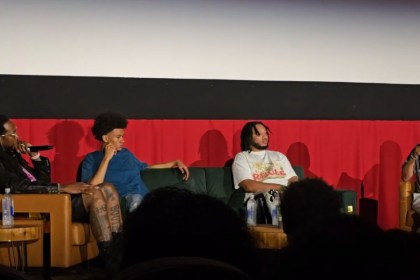
Of course, 1963 was a significant year in American history: George Wallace was sworn in as governor, four little black girls were killed attending 16th Street Baptist Church, President John F. Kennedy was assassinated, Lyndon Johnson became the 36th president. Still, as all of this was going on, people were carrying out their lives. During this time, Rusty Cundieff was a child who wanted one thing: to drink from the “Whites only” water fountain in town. Today, Cundieff has turned his story into a movie and he hopes to share his experience with others.
Did you base White Water on your personal experiences? What was the basis for the movie?
White Water is based on the true story of Michael Bandy who grew up in Opelika, Alabama, and actually did, as a 6-year-old, decide after watching a White friend drink and drink from the “Whites only” fountain that it simply must have tasted better than the colored fountain, and determined that he would in some way drink from it himself.
I, of course, brought my own personal experience to the production as all of the actors and creative people working with us did. Obviously, some of Michael’s story is filtered through my lens. For instance, the Jesus pictures and their constant changing was something that I wanted to do in another script, but I felt it would work well here. So, I had Michael and his writing partner Eric work it into the story each time Michael got a spanking with the switch. I, like Michael, got plenty of switches in my childhood; mostly from my grandmother, who I loved and miss dearly.
I think White Water is a metaphor for a lot of other things. Did you intend that?
Yes, White Water definitely connects metaphorically to race, religion even politics. The really wonderful thing about the film is that it is seen through a child’s eyes, and because of that we get to look at race in a very unique way. Really, the whole subtext of the film comes down to “perception versus reality.” At the beginning of the film, no one has a clear perception. Michael’s mom doesn’t believe in her son’s abilities, nor has faith she can open a restaurant. The reverend has his own limited mindset. Some of the white characters don’t properly see the black folk and then of course there is Michael, who doesn’t initially see that water for what it is, but ultimately in revealing its truth, opens the eyes of those around him to see a new more accurate reality.
How did you assemble such a great cast and what were the qualities you were looking for?
There were some fortunate accidents that allowed us to get the folks we got. The two boys who played Michael, Amir and Amari O’Neil, fell from heaven. If there was anything saying the universe wanted this film to be made it was finding these two talented kids. We simply could not have made the film on our budget without twins that could both act very well.
As for the others, Larenz Tate, who plays Terrence, and Sharon Leal, who plays Michael’s mother Annie, well I’ve been a fan of Larenz since his performance in Menace to Society and for Annie, I wanted someone who was attractive but not glamorous (which of course Sharon Leal can be) but she also knows how to play a more quiet beauty. Both actors were a dream to work with. Shabaka Barry Henley, who plays the Pastor, was a friend and someone I’d worked with on my first film, Fear of a Black Hat, and always wanted to work with again. His comedic timing while remaining sensitive and real are impeccable.
The other kids, Zhane Hall, as Red, and Storm Reid, as Cassandra, were just fantastic kids with some serious ability for actors their age. Then we got some great folks from the Atlanta area in Leon Lamar, who played Grandpa Alex, Daniel Thomas May, who played Deputy Darryl, and Pat Brown, the actress that plays Sophia the juke joint owner who is truly a star waiting to happen.
Celebrate the 21st annual Black Harvest Film Festival Aug. 8 through Sept. 3 at the Gene Siskel Film Center. White Water runs Aug. 16 and Aug. 17.
















